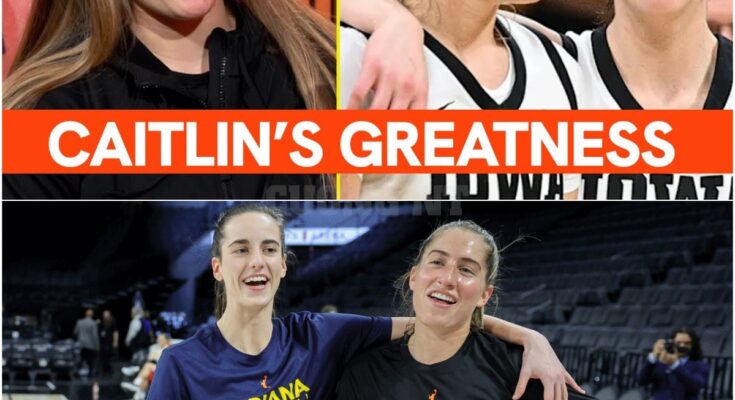Kate Martin didn’t know Caitlin Clark when the five-star prospect first visited Iowa. She had heard the name, seen the buzz, watched the high school clips where Clark was dropping 40 like it was nothing. But like many veterans, she had her doubts. “I thought, ‘This girl thinks she’s going to come in and rule the world,’” Martin admits with a smile. “And then she did.”

What followed was one of the most electric college basketball partnerships in recent memory. Clark’s undeniable talent and Martin’s steady leadership helped launch Iowa into national prominence—and reshape the trajectory of women’s sports in America.
When Clark arrived, Martin already had years under her belt. She wasn’t just a captain; she was the glue. Her leadership style was calm, deliberate, rooted in trust. She built connections with teammates off the court, believing firmly in what she calls “relationship equity.”
“If you’re going to tell someone hard things, they need to know you care about them,” Martin explained. “Caitlin knew I was there for her. I didn’t just talk to her when something went wrong—I talked to her all the time.”
That trust would become vital, especially during the early years when Clark’s aggressive style and raw competitiveness could sometimes overwhelm a young team. Martin became the balance—the steady hand reminding Clark to take a breath, look up, and refocus. “She just had this mindset,” Martin said. “She wasn’t going through the motions. She was there to kick your butt in every drill.”
But that fire paid off. In their first year together, Iowa notched big early wins—including one over Iowa State that turned heads. It wasn’t all smooth sailing; there were highs and lows. But by season’s end, something had clicked.
Fast forward to 2023, and Iowa’s Cinderella story was in full motion. Their upset over South Carolina—ending the Gamecocks’ undefeated season—remains one of the greatest moments in NCAA women’s basketball history. “That was probably the best moment of my career,” Martin said. “Nobody expected us to win. But we executed that game plan perfectly. That night felt like magic.”
It wasn’t just about basketball, though. Martin and Clark weren’t just teammates; they were catalysts. With packed arenas, soaring TV ratings, and viral moments lighting up social media, they helped propel women’s basketball into a new stratosphere of visibility and financial potential.
The growth was palpable. Iowa’s Final Four games shattered records, becoming some of the most-watched basketball broadcasts—men’s or women’s—of the decade. “It doesn’t really hit you until someone says it out loud,” Martin reflected. “We had 55,000 people in a football stadium. That’s insane.”
And with that spotlight came opportunity. Martin, who stayed a sixth year thanks to a COVID eligibility waiver, considered walking away after her fifth. “I didn’t think I’d stay,” she confessed. “Monica [Czinano], my best friend, wasn’t coming back. I didn’t know if I could do it without her.”

But something changed. The rise of NIL (Name, Image, and Likeness) meant Martin could walk away not just with a degree, but with money in her pocket—$20,000 to be exact. “In Iowa City, that’s like $100K,” she joked. “I tell that story not to brag, but because nowadays that number seems small. But back then, it was huge for me.”
She also saw unfinished business. A master’s degree. Another shot at the Final Four. Another year to grow with Clark and lead a team that had already accomplished so much.
And they delivered again—making it to back-to-back national championship games. But the ending wasn’t what they wanted.
The second loss stung more. “We knew we wouldn’t get another shot. That was it. We blew our chance,” Martin said. Still, she doesn’t dwell on it. “We changed women’s basketball. It wasn’t just about winning or losing.”
Indeed, the impact of those Iowa teams has gone far beyond campus borders. They’ve become the face of a movement—one that includes record NIL deals, higher-paying sports scholarships, and a surge in young girls picking up a basketball for the first time.
Clark may be the highlight reel, but Martin was the foundation. And their bond was undeniable.
“She made us all better,” Martin said of Clark. “But it was mutual. We challenged each other. We trusted each other. And we built something that’ll outlast the box scores.”
Today, Martin is remembered for more than her game. She’s known as “Money Martin,” the glue, the voice in the huddle, the leader who helped steer a generation-defining team through unprecedented visibility and pressure.
And if you ask her whether she’s let go of those championship losses? “Yeah, I’ve made peace with it. There were bigger things happening. We left a legacy—and that’s something I’ll always be proud of.”
That legacy continues as Caitlin Clark now headlines the WNBA and college basketball looks to sustain its newfound attention. But make no mistake—Kate Martin’s role in all of this is far from forgotten.
Because in the story of how women’s college basketball became mainstream entertainment, she wasn’t just a side character. She was the steady voice behind the roar.


